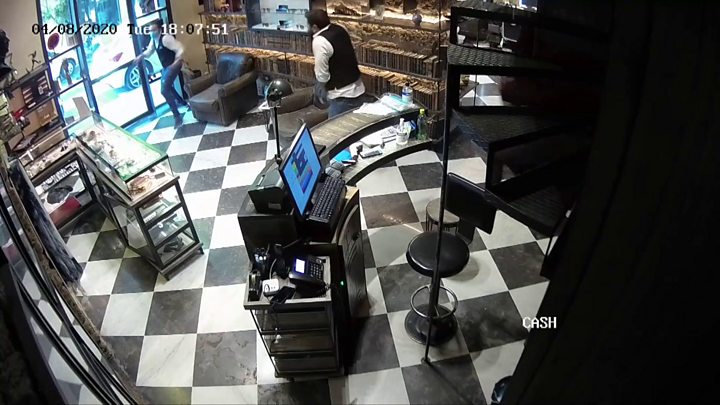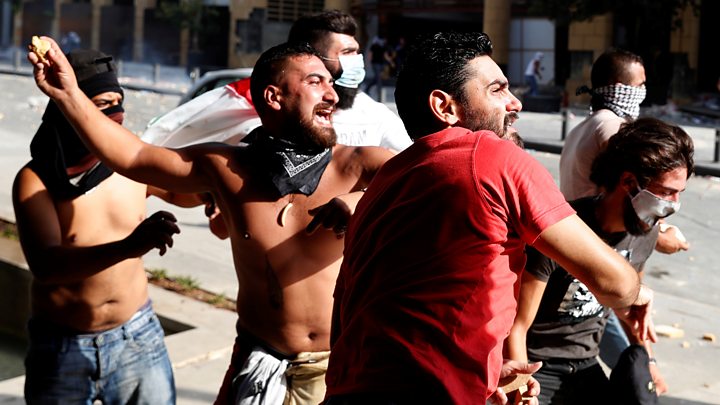Beirut explosion: Aid summit opens with Macron call for quick action

French President Emmanuel Macron has called for quick action to help Lebanon as he opened an international aid summit five days after the devastating explosion in Beirut.
The aid needed to reach the Lebanese people efficiently, he said.
US President Donald Trump is among those due to join the online meeting.
Officials estimate the blast at a warehouse, which stored more than 2,000 tonnes of ammonium nitrate, caused up to $15 billion (£11.5bn) in damage.
The explosion left at least 158 people dead, 5,000 injured and 300,000 homeless.
On Saturday several thousand people took to the streets in anger, with police firing tear gas at stone-throwing protesters and some demonstrators storming government ministries.
In a televised address, Lebanese PM Hassan Diab said he would ask for early elections as a way out of the crisis. The issue will be discussed in cabinet on Monday.
Lebanon was already mired in a deep economic crisis and struggling to tackle the coronavirus pandemic before the explosion tore through Beirut.
An anti-government protest movement erupted last October, fuelled by the financial situation and a collapsing currency.
Information Minister Manal Abdel Samad became the first official to resign in the wake of the blast. Announcing her decision to quit, she cited the failure of the government to carry out reforms and the "Beirut catastrophe" as her reasons for leaving.
What's happening on Sunday?
"The objective today is to act quickly and effectively to co-ordinate our aid on the ground so that it goes as efficiently as possible to the Lebanese people," Mr Macron said.
International support should also go towards an impartial, credible and independent inquiry into how the disaster was allowed to happen, he told fellow leaders.
Representatives from European Union member states, China, Russia, Egypt, Jordan and the UK were also due to take part, with many others invited to attend.
In a statement, the UK said it would pledge an additional £20m in "urgent humanitarian support" at Sunday's talks, on top of a £5m aid package announced earlier this week.
"This support will help the country's most vulnerable through the existing economic uncertainty and additional suffering caused by the explosion by going directly to those families most at risk to cover essential survival needs, including access to food and medicine," it said.
In a series of tweets, President Trump said he had discussed the "catastrophic event" in Beirut with Mr Macron and would himself join the call.
"Everyone wants to help!" he wrote.
A number of countries have already pledged millions of dollars worth of aid and sent ships, health workers and materiel to assist Beirut.
But UN agencies have called for more help and warned about the massive challenge ahead. Many homes are without water or electricity, there are growing worries about food shortages, and cases of Covid-19 are spiking in the country - an additional challenge for hospitals which are already overwhelmed.
"The needs are immediate and they are huge," Unicef spokeswoman Marixie Mercado told reporters in Geneva on Friday.
What happened at the protests?
The aid conference comes amid ongoing fury about the government's failure to stop the blast.
Between 5,000 and 10,000 people gathered for demonstrations on Saturday, to show that rage and also to remember those victims of the explosion.
As the protests got under way, mock gallows were erected in Martyrs' Square to indicate the demonstrators' view of the country's political leaders.
Skirmishes began early on, with police responding to rocks and sticks thrown by protesters with rubber bullets and tear gas.
Police confirmed to Reuters news agency that live ammunition had been fired in central Beirut, though it is not clear by whom.

One officer died after falling into a lift-shaft in a hotel, reportedly after being chased there by protesters.
The local Red Cross said it treated 117 injured people at the scene. Another 55 were taken to hospital.
Dozens of protesters stormed government ministries and the headquarters of the country's banking association.
The raids started after a group of people chanting anti-government slogans and burning a portrait of President Michel Aoun entered the foreign ministry and called for all ministries to be occupied.
Reports suggest security forces have since retaken the buildings from the demonstrators.
Are you in Beirut? How have you been affected by the explosion? Share your experiences by emailing haveyoursay@bbc.co.uk.
Please include a contact number if you are willing to speak to a BBC journalist.